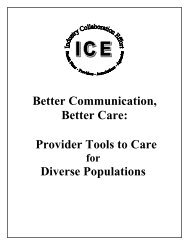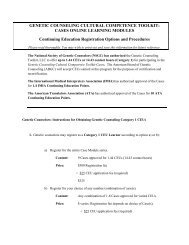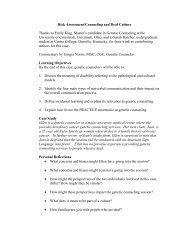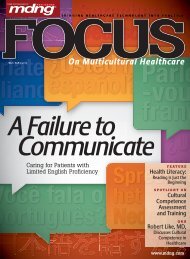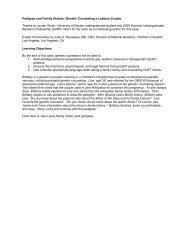Advanced Effective Communication, Cultural Competence, and ...
Advanced Effective Communication, Cultural Competence, and ...
Advanced Effective Communication, Cultural Competence, and ...
Create successful ePaper yourself
Turn your PDF publications into a flip-book with our unique Google optimized e-Paper software.
A Roadmap for Hospitals<br />
Appendix E: Resource Guide<br />
8. The Pfizer Clear Health <strong>Communication</strong> Initiative<br />
provides estimates of the percentage of patients who might<br />
have limited health literacy based on specific patient<br />
demographics. Available at http://www.pfizerhealthliteracy<br />
.com/physicians-providers/prevalence-calculator.html.<br />
9. The Association for Community Health Improvement’s<br />
Community Health Assessment Toolkit is a guide for<br />
planning, leading, <strong>and</strong> using community health<br />
assessments to improve the health of communities.<br />
Available at http://www.assesstoolkit.org.<br />
Workforce Domain<br />
Working with an Interpreter<br />
1. Massachusetts Department of Public Health’s Best Practice<br />
Recommendations for Hospital-Based Interpreter Services<br />
identifies <strong>and</strong> describes components of an optimal<br />
interpreter services program for hospitals. Available at<br />
http://www.mass.gov/Eeohhs2/docs/dph/health_equity/<br />
best_practices.pdf.<br />
2. Addressing Language Access Issues in Your Practice: A Toolkit<br />
for Physicians <strong>and</strong> Their Staff Members sponsored by the<br />
California Academy of Family Physicians provides<br />
information on identifying the patient population, different<br />
types of interpretation services, <strong>and</strong> model procedures <strong>and</strong><br />
policies. Available at http://www.calendow.org/uploaded<br />
Files/language_access_issues.pdf.<br />
3. Minnesota Department of Human Services’ “Tips for<br />
Working with Interpreters” helps to maximize<br />
effectiveness when a provider is working with an<br />
interpreter. Available at http://www.dhs.state.mn.us/<br />
main/idcplg?IdcService=GET_DYNAMIC_<br />
CONVERSION&RevisionSelectionMethod=Latest<br />
Released&dDocName=id_051607.<br />
4. Association of American Medical College’s Guidelines for Use<br />
of Medical Interpreter Services is a resource for medical<br />
students who need additional guidance regarding the use of a<br />
medical interpreter during interactions with limited English<br />
proficient (LEP) patients. Available at http://www.aamc.org/<br />
students/medstudents/interpreter_guide.pdf.<br />
5. Rush University Medical Center’s Communicating Through<br />
Health Care Interpreters offers a series of online courses to<br />
train doctors on how to work with professional<br />
interpreters, how to guide an untrained interpreter, <strong>and</strong><br />
how to work with a telephone interpreter. Available at<br />
http://www.vlh.com.<br />
6. Health Care Interpreter Network <strong>and</strong> Kaiser Permanente’s<br />
Qualified Interpreting for Quality Health Care: A Training<br />
Video for Clinical Staff on How to Work with Interpreters<br />
covers topics such as the importance of using a qualified<br />
interpreters, key protocols for language interpreting<br />
including confidentiality <strong>and</strong> first-person interpreting,<br />
cultural considerations, <strong>and</strong> tips for using remote<br />
interpreters (telephonic <strong>and</strong> video). Requests for copies<br />
should be sent to: infor@hcin.org.<br />
7. American Speech–Language–Hearing Association’s Web<br />
site has “Tips for Working with an Interpreter,” including<br />
selecting an interpreter <strong>and</strong> things to be aware of before,<br />
during, <strong>and</strong> after a session using an interpreter. Available<br />
at http://www.asha.org/practice/multicultural/issues/<br />
interpret.htm.<br />
<strong>Cultural</strong> Competency Training<br />
1. The California Endowment offers several resources<br />
including the following:<br />
• Principles <strong>and</strong> Recommended St<strong>and</strong>ards for <strong>Cultural</strong><br />
<strong>Competence</strong> Education of Health Care Professionals<br />
provides guidance on content, training methods <strong>and</strong><br />
modalities, evaluation, <strong>and</strong> qualifications of teachers<br />
<strong>and</strong> trainers. Available at http://www.calendow.org/<br />
uploadedFiles/principles_st<strong>and</strong>ards_cultural_<br />
competence.pdf.<br />
• Resources in <strong>Cultural</strong> <strong>Competence</strong> Education for Health<br />
Care Professionals is a compilation of guidebooks,<br />
guidelines, manuals, articles, reports, videos, journals,<br />
<strong>and</strong> Web sites designed to help health care professionals<br />
to provide culturally appropriate education. Available at<br />
http://www.calendow.org/uploadedFiles/resources_in_<br />
cultural_competence.pdf.<br />
• The Multicultural Health Series is a collection of 10<br />
video case studies <strong>and</strong> training materials designed to<br />
educate providers about the meaning <strong>and</strong> importance<br />
of cultural competence in health care. Available at<br />
http://www.calendow.org/uploadedFiles/multicultural_<br />
health_series.pdf.<br />
2. PRIME’s continuing medical education (CME) online<br />
activity Best Practices to Achieve <strong>Cultural</strong> <strong>Competence</strong> in<br />
Health Care for physicians, nurses <strong>and</strong> nurse practitioners,<br />
<strong>and</strong> pharmacists focuses on increasing awareness of<br />
cultural <strong>and</strong> linguistic barriers that can occur between<br />
health care providers <strong>and</strong> patients of diverse backgrounds<br />
<strong>and</strong> enables providers to overcome these barriers to<br />
provide culturally competent care. Available at<br />
http://primeinc.org/cme/online/178/Best_Practices_to_<br />
Achieve_<strong>Cultural</strong>_<strong>Competence</strong>_in_Health_Care.<br />
80



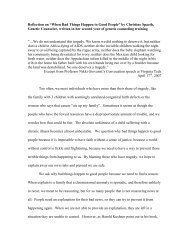
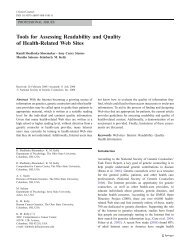

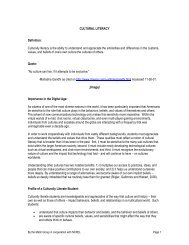
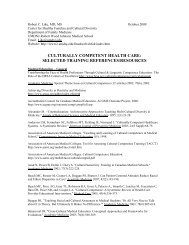
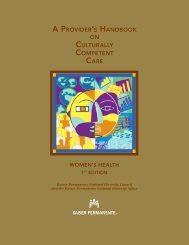
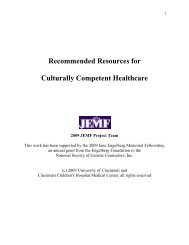
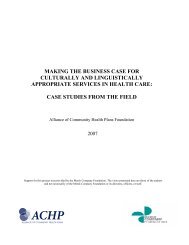
![Breaking Bad News PPT[1] - Genetic Counseling Cultural ...](https://img.yumpu.com/35003134/1/190x146/breaking-bad-news-ppt1-genetic-counseling-cultural-.jpg?quality=85)
